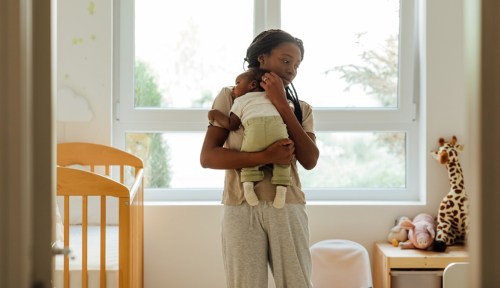Our editors independently select these products. Making a purchase through our links may earn Well+Good a commission
Here’s When To Get Back on Birth Control After Having a Baby, if You’re Definitely Not Trying To Get Pregnant
Learn what OB/GYNs say is the best strategy for postpartum birth control, if you're not trying to get pregnant again right away.

Having a baby is a monumental task for your body. No matter how fit you are going into delivery, nor what your pregnancy and childbirth experience looks like, recovering, both mentally and physically, postpartum is a necessity (even if the infrastructure for postpartum care and support in this country is severely lacking).
Experts in This Article
This is all to say, if you’ve recently had a baby, you may be wondering what to do right now to avoid pregnancy until you’re ready to conceive again (if that’s something you want). Should you immediately go back on the same form of birth control you used before your pregnancy? Should you try an IUD instead? If you don’t have a regular period again, does it even matter?
We asked a few OB/GYNs and fertility pros to share the ins and outs of going back on birth control after childbirth so you can take the guesswork out of the equation and just focus on you and your new baby.
First, know that you can get pregnant almost immediately after giving birth
Though it’s unlikely, you can get pregnant again as early as three weeks after childbirth. To be fair, it’s entirely normal if you don’t want to have sex quite so soon after giving birth—and most OB/GYNs recommend waiting until at least six weeks to allow the body to heal.
But once you are getting intimate again, another pregnancy is entirely possible. “Right after you give birth, the body is undergoing drastic changes in hormones,” says Nicole Avena, PhD, author of What to Eat When You’re Pregnant as well as a professor of neuroscience specializing in nutrition at Mount Sinai School of Medicine. Specifically, progesterone and estrogen both drop significantly following childbirth. And while your hormones may continue to fluctuate for at least six weeks postpartum (what’s commonly referred to as the fourth trimester), you can very much still get pregnant during this time, she adds.
That’s true no matter if you haven’t had a period or are actively breastfeeding—two common misconceptions, says Rachel Danis, MD, a reproductive endocrinologist, infertility specialist, and board-certified obstetrician and gynecologist at RMA of New York. “I have seen women get pregnant very quickly after delivery because, even though they haven’t had a regular cycle, they’re forgetting that you don’t need to have a regular cycle to ovulate,” Dr. Danis says.
Upon delivery, there’s a steep rise in the hormone prolactin, which is released from the brain to your breast tissue in order to produce breast milk, Dr. Danis explains. This increase in prolactin causes a suppression or a decrease in the production of FSH (follicle stimulating hormone) and LH (luteinizing hormone). When those two hormones are not actively being released from your pituitary gland, you’re not going to start having a cyclical, or predictable menstrual cycle, she adds.
Actively breastfeeding will sustain your prolactin production, which could prevent menstruation, but “you can still have a sporadic ovulation,” says Dr. Danis. “You ovulate two weeks before a period, so you may think you haven’t ovulated because you haven’t had a period, but yes you certainly could have ovulated.”
There are risks associated with getting pregnant again too soon
The American College of Obstetricians and Gynecologists (ACOG) recommends avoiding another pregnancy entirely within six months after giving birth and cautions of “adverse outcomes” associated with getting pregnant before 18 months postpartum, including uterine rupture for those who previously had a cesarean delivery.
The window of time for the greatest concern is actually rather short, though. “If you’re getting pregnant within six weeks of your last delivery, then the mom is at risk of all of the things that women are at risk for when they’re pregnant, but even more so because they have the fourth trimester [postpartum period] plus this new first trimester,” says Dr. Danis. ”So you’re at a higher risk of blood clots, which is number one, and getting a hypertensive disorder during pregnancy; your cardiovascular volume is increased and your respiratory reserve in your lungs is lower. All of that is exacerbated when you’re pregnant.”
Still, ACOG also reports that one in three people who give birth do get pregnant again before the optimal 18-month mark, and experts emphasize that there’s no need to panic if this happens to you. “It is important to not worry and keep in close communication with your healthcare provider as they can answer questions and monitor any changes,” Dr. Avena says. The most common things to be aware of are low birth weight, preterm birth, and small size for gestational age, she adds. And of course, there’s a chance you simply may not know you are pregnant again, especially if you have yet to return to a typical-for-you menstrual cycle and period, Dr. Danis adds. So, getting prenatal care ASAP is key.
So, when should you get back on birth control?
Getting back on birth control postpartum will not only help prevent an unplanned pregnancy, but protect you from the increased health risks of back-to-back pregnancies. Plus, depending on the type you choose, you can start as quickly as the same day you give birth.
You can have an IUD inserted within the first 10 minutes after delivering your baby and placenta while you’re still in the hospital, Dr. Danis says. “I personally love [opting for the IUD] immediately because the person typically has an epidural or some sort of anesthesia whether you’re having a vaginal delivery or a c-section,” she says. “IUDs are the best. It’s a set it and forget it [type of birth control]. They last for seven to 10 years, but you don’t have to keep it in for that long. Even if you just want it for two years, keep it in for two years.”
ACOG cautions against going on an estrogen-containing birth control, such as the pill, vaginal ring, or patch, for the first couple of weeks postpartum since these may increase your risk of a blood clot. This type of birth control could also diminish your breast milk supply, but as long as there is proper nipple stimulation and consistent feeding or pumping, the difference should be negligible, Dr. Danis says.
While your doctor may discuss birth control options during your six-week postpartum appointment, Dr. Danis cautions against waiting that long to get back on birth control due to all of the risks of early, unplanned pregnancy. The ACOG takes this recommendation one step further, noting that a good time to choose a postpartum birth control method is when you’re still pregnant.
Regardless of which type of birth control you choose or when you decide to go back on birth control after having a baby, you will need a back-up barrier method for the first five to seven days. This allows your body adjusts to the new method, and solves for any lapse in protection, Dr. Danis says, who cautions that even a slight deviation from taking a birth control pill as prescribed can impact its efficacy. That means, for the first week starting any kind of birth control (pill, IUD, or otherwise), or switching birth control types or brands, you’ll also need to use a condom.
Sign Up for Our Daily Newsletter
Get all the latest in wellness, trends, food, fitness, beauty, and more delivered right to your inbox.
Got it, you've been added to our email list.










